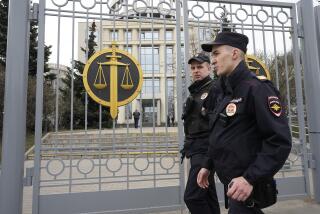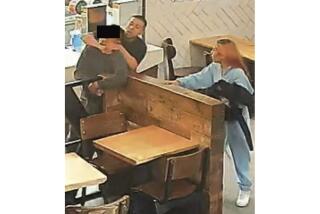Suspects in Smuggling Ukrainians Go on Trial
- Share via
Prosecutors will rely on wiretap evidence to prove that organizers of a Ukrainian smuggling ring brought hundreds of people into the United States illegally through Mexico, forcing many into prostitution, Assistant U.S. Atty. Mark Aveis said Tuesday during opening statements in the case against seven defendants.
Aveis said federal agents had listened to phone calls between North Hills residents Tetyana Komisaruk, 50; her husband, Valeriy, 40; and others that revealed plans and methods to smuggle the immigrants into Mexico and then lead them to the United States on boat, car or foot since 1999.
“[The calls] were like a play-by-play commentary by defendants regarding their own activity,” Aveis told a jury in U.S. District Court.
During a June 30, 2000, phone call, Tetyana Komisaruk told an operative that he could do whatever he wanted to the women he was in the process of smuggling, including chaining them up, Aveis said. The women, many as young as 18, were constantly referred to as “whores.”
Other calls detailed plans to bring Ukrainians by Greyhound bus from Tijuana to Los Angeles, federal prosecutors said.
Two attorneys for the alleged smuggling ring leaders--Valeriy Komisaruk and Oleksandr Latyshev--also presented opening statements Tuesday.
Attorney Ellen Barry said her client, Komisaruk, helped fulfill the dreams of Ukrainians desperate for a better life in the United States.
“Their dream was so strong that they did whatever they could to get here,” Barry said. “The route they found was to go to Mexico and sneak across the border.”
Latyshev’s attorney, Errol Stambler, said his client did not intend to violate the law and didn’t do it for financial gain.
The trial is expected to last more than a month.
Federal prosecutors said they will call women who were smuggled to testify that they were forced to work as prostitutes and to turn over their money to defendant Serge Mezheritsky, 36, of Hollywood.
The thousands of dollars Ukrainian immigrants paid for their voyage were hidden in various bank accounts and real estate, Aveis said. The defendants also made the immigrants pay for Levis jeans and other “American” clothing they were provided so they would fit in. The immigrants were taught how to say in English that they were United States citizens when questioned at the border. Women were charged $250 to bleach their hair blond, Aveis said.
“They made them look like day visitors to Mexico going back to the U.S.,” he said.
The prosecution will also introduce evidence from Aug. 14, 2000, when border agents stopped a Lincoln Continental because they noticed the back of the car was dragging. Agents found two Ukrainian immigrants in the trunk, Aveis said. The vehicle registration was linked to the Komisaruks.
More to Read
Sign up for Essential California
The most important California stories and recommendations in your inbox every morning.
You may occasionally receive promotional content from the Los Angeles Times.













